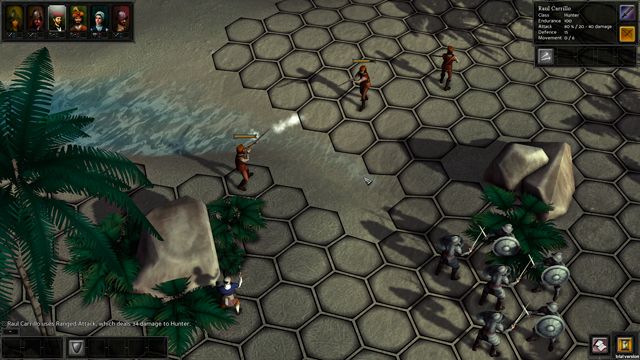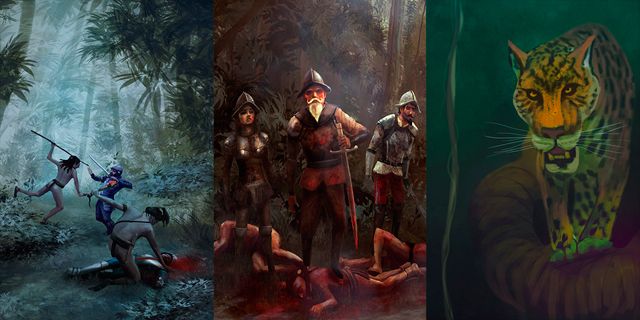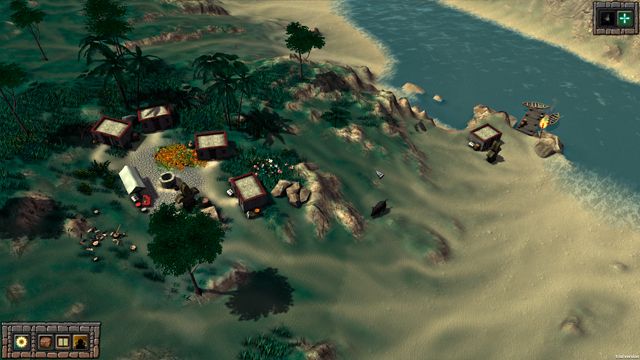RPG Codex Preview: Expeditions: Conquistador
RPG Codex Preview: Expeditions: Conquistador
Preview - posted by Zed on Sat 8 September 2012, 14:59:07
Tags: Expeditions: Conquistador; Logic ArtistsLogic Artists' Expeditions: Conquistador now has four days left on Kickstarter, with little left to go to reach their target $70K goal. Codexer Tigranes has written a preview for you if you need convincing to pledge, based on some playtime with a press version of the game.
Here's a bit on character development in Expeditions:

Thanks Tigranes for the write-up!
Read the full article: RPG Codex Preview: Expeditions: Conquistador
Here's a bit on character development in Expeditions:

Expeditions involves two types of characters. The first is the protagonist; he/she does not fight in battles, and in fact is generally not present in the gameworld, but interacts at a more abstract level, such as in dialogues. You begin the game by picking a name and gender for your hero, and distributing points into 5 attributes: Tactics (greater maneuverability in combat), Leadership (follower loyalty), Diplomacy (persuasion in dialogue), Healing and Hunting (self-explanatory). It’s hard to know how well balanced these attributes will be over the course of the entire game, but nothing immediately stands out as useless or obvious at the present - an advantage of a simpler system. The downside is that there is very little scope for customisation or personalisation; you can’t even choose a portrait, at least in the press build. I missed that little extra dash of colour, perhaps like a small selection of backgrounds à la Arcanum.
The real focus is on the followers, who are disposable, pre-set characters with their own specialties and personalities. You begin by choosing ten followers from a static pool of 30, divided into five jobs (the Kickstarter page promises ten): doctor, hunter, scholar, scout and soldier. I didn’t get much use out of scholars in the press build, especially as they and scouts cannot fight, but the other three roles were very generic, falling into the tank / archer / healer stereotypes. In addition, they have a mix of personality traits like 'Pious', 'Narcissistic' and even 'Racist', and come with a short bio that knits it all together into simple but believable personalities. They might be best understood as a simpler version of Jagged Alliance 2’s mercenaries. Subsequently, I found two main ways of customising the followers. Each battle accrued a shared pool of experience, which I could expend on any follower to level them up. I don’t know if the press build hiked up XP gain, but I could generally level up one follower after two battles at most, and there were only 5 levels. Each level seemed to unlock a new skill, making it 5 skills per class. The doctor begins with a basic heal skill, for example, while the hunter begins with a double-shot then unlocks an aimed shot that negates the distance penalty. I could also find or purchase ‘equipment’, again a general resource I could use to increase a follower’s melee, ranged or defensive capabilities.
The real focus is on the followers, who are disposable, pre-set characters with their own specialties and personalities. You begin by choosing ten followers from a static pool of 30, divided into five jobs (the Kickstarter page promises ten): doctor, hunter, scholar, scout and soldier. I didn’t get much use out of scholars in the press build, especially as they and scouts cannot fight, but the other three roles were very generic, falling into the tank / archer / healer stereotypes. In addition, they have a mix of personality traits like 'Pious', 'Narcissistic' and even 'Racist', and come with a short bio that knits it all together into simple but believable personalities. They might be best understood as a simpler version of Jagged Alliance 2’s mercenaries. Subsequently, I found two main ways of customising the followers. Each battle accrued a shared pool of experience, which I could expend on any follower to level them up. I don’t know if the press build hiked up XP gain, but I could generally level up one follower after two battles at most, and there were only 5 levels. Each level seemed to unlock a new skill, making it 5 skills per class. The doctor begins with a basic heal skill, for example, while the hunter begins with a double-shot then unlocks an aimed shot that negates the distance penalty. I could also find or purchase ‘equipment’, again a general resource I could use to increase a follower’s melee, ranged or defensive capabilities.
Thanks Tigranes for the write-up!
Read the full article: RPG Codex Preview: Expeditions: Conquistador
Preview written by Tigranes
Expeditions: Conquistador is a lamentably hard-to-abbreviate name for a squad-based exploration game. Composed primarily of turn-based squad combat, exploration in the 16th century New World and dialogue-based adventure events, it follows in the tradition of games such as Sid Meier’s Pirates! and KOEI’s Uncharted Waters. Part RPG, part strategy, you talk to people and pick up quests, wander about locating resources, deal with random events like disease and theft, and sleep at night dreaming of great colonial glory.
The game is an indie effort by Logic Artists, a small Copenhagenian outfit, and at the time of writing, has just 4 days to go on its $70,000 kickstarter bid for

All reviews are subjective; this preview is written after some 7 hours with Expeditions’ press build, which includes the opening areas of the game. I’ve also been on the fence on whether to fund the project on Kickstarter or not, and expect to make my decision… well, by the time I finish writing this thing. How does Expeditions’ relatively serious commitment to the setting play out? Is it merely a ragtag collection of smaller features and mini-games, or a solid effort that coheres into a whole? Can it offer a genuine challenge to replicate the experience of a new and hostile land? I won’t answer those questions – read on and make up your own mind.
Character Development
Expeditions involves two types of characters. The first is the protagonist; he/she does not fight in battles, and in fact is generally not present in the gameworld, but interacts at a more abstract level, such as in dialogues. You begin the game by picking a name and gender for your hero, and distributing points into 5 attributes: Tactics (greater maneuverability in combat), Leadership (follower loyalty), Diplomacy (persuasion in dialogue), Healing and Hunting (self-explanatory). It’s hard to know how well balanced these attributes will be over the course of the entire game, but nothing immediately stands out as useless or obvious at the present - an advantage of a simpler system. The downside is that there is very little scope for customisation or personalisation; you can’t even choose a portrait, at least in the press build. I missed that little extra dash of colour, perhaps like a small selection of backgrounds à la Arcanum.
The real focus is on the followers, who are disposable, pre-set characters with their own specialties and personalities. You begin by choosing ten followers from a static pool of 30, divided into five jobs (the Kickstarter page promises ten): doctor, hunter, scholar, scout and soldier. I didn’t get much use out of scholars in the press build, especially as they and scouts cannot fight, but the other three roles were very generic, falling into the tank / archer / healer stereotypes. In addition, they have a mix of personality traits like 'Pious', 'Narcissistic' and even 'Racist', and come with a short bio that knits it all together into simple but believable personalities. They might be best understood as a simpler version of Jagged Alliance 2’s mercenaries. Subsequently, I found two main ways of customising the followers. Each battle accrued a shared pool of experience, which I could expend on any follower to level them up. I don’t know if the press build hiked up XP gain, but I could generally level up one follower after two battles at most, and there were only 5 levels. Each level seemed to unlock a new skill, making it 5 skills per class. The doctor begins with a basic heal skill, for example, while the hunter begins with a double-shot then unlocks an aimed shot that negates the distance penalty. I could also find or purchase ‘equipment’, again a general resource I could use to increase a follower’s melee, ranged or defensive capabilities.

If it all seems a bit simple, well, it is. My impression is that beyond the first few hours, I will begin to miss the ability to select skills and customise my followers a little more, or hand them special weapons or pieces of equipment. The Kickstarter campaign had promised the inclusion of ability trees as a stretch goal; at the moment, the system feels solid and effective, but with too little to offer to the kind of player who loves trying out different party combinations and character builds.
Let me return, however, to the personalities feature, which certainly tries to add colour to the follower system. On the character screen, at least, each follower is indeed unique, and the personalities seem to play a key role in dialogue-based events. In one playthrough, I was negotiating with a priest about the reward for delivering a shipment of bibles, when Juan Ortega, an Altruistic and Courageous character, interjected that we could surely do without such haggling. Like any good capitalist I rebuffed him; I saw later that his morale had dipped slightly. No doubt there will be more controversial decisions and consequences later on in the game. Unfortunately, these moments seem to be the only ones when the followers actually achieve memorability. In combat, there is no real individualisation. The followers have no voice acting, and also lack any sort of text taunts or comments. Consider Marcus in Fallout 2: he is distinguished by virtue of being a humongous mutant who would throw intelligent quips about bloody murder, all the while being prone to shred ally and enemy alike with his machine gun. In comparison, one of my hunters, Raul Carrillo, felt in battle not like a Racist, Narcissistic and Adventurous fellow, but a walking bag of hit points that is good with ranged attacks. Expeditions: Conquistador has a solid basic system for an engaging and memorable experience with your followers; time will tell as to whether that potential can be fully explored, or whether it is mostly confined to certain sections of the game.
Exploration
Expeditions’ exploration in towns and the wilderness basically boils down to (1) Walk along the hexes; (2) Click on giant icons for points of interest; (3) If in wilderness, have random events happen to you. The gameworld resembles the oddly proportioned emptiness of a Civilization map; gigantic fleur de lys icons (seriously, if they fell on you it’d be game over) mark people to talk and trade with. All this shows that you’re not here for a fully-fledged RPG experience – you’re in towns to pick up quests, directions and resources, ready to head out on the next trek across the New World.
Navigating the wilderness is relatively dangerous, and requires some degree of planning. You can only move a certain number of hexes before needing to camp, something that expends rations; I wasn’t able to check what the effects of starvation were, as this was not implemented in the press build. You will also be beset by random events, the most common being diseases. At one point, I also had to deal with a theft of valuables, where I could pick from various dialogue options and skill checks. I managed to find the culprit, one of the followers (with the Greedy trait), and decide on her punishment.
The map itself is already large, though how much of the finally playable area I could see was not clear. I spotted a temple, small fishing villages and Spanish settlements in the vicinity, though some of these consisted of little more than a single trader. There is certainly a sense of trekking across a hostile land, as you must often journey for several days to get to anywhere, expending rations and risking disease.
Combat
None of this, however, would have much meaning if you weren’t bashing in skulls and blowing out brain lasagna by the dozens. Combat is a familiar affair for anyone who's ever played turn-based squad combat games, whether in the tradition of Heroes of Might and Magic, Age of Wonders and King's Bounty, Jagged Alliance 2, or even Fallout. You take turns to move, kill, maim, and they do too. In the press build I took between 3 and 6 followers into a relatively small area each battle, and wrapped everything up within 10 to 15 turns. Worth mentioning is a relatively flexible basic mechanism, where you can select any follower to give orders to at any given time; you can order a hunter to move out of the way, then a soldier to proceed through the gap and attack the enemy, then move back, then order the hunter to shoot the enemy again - if you have spare movement. There are no explicit movement or action points, but the grid colours show you how far you can move without giving up an action. This in itself resolves many of the frustrations involved with TB combat (like your own men getting stuck behind each other). Alas, one large annoyance remains; the turgid pace. Animation speeds are fairly pedestrian, and you can't give orders or even plan your next action with tooltips if there is an animation / action in progress. A combat speed option, as found in games like Wizardry 8, seems a must to reduce this tedium.

In the press build, I was able to level up a few times, and face basic Spanish and native groups in battle. At this stage of the game, the combat felt solid, but basic, and ultimately a little bland. My own squad would be composed of three very basic roles - tanking Soldiers, sharpshooting Hunters, healing Doctors - and so would, in fact, the Spaniards. Even the natives appeared to be divided into Warriors, Trappers and Shamans, seemingly only different in name and costume. Here I come back to the point about having more followers with special abilities or some kind of distinguishing feature in combat. There are, at least, basic traps and barricades you can purchase and lay down, to provide cover against ranged fire or deal damage to enemies; attacks of opportunity and flanking rules also force you to think a little bit before committing all your soldiers into chaotic melee combat. However, terrain seems to have no impact on movement or accuracy, and the maps are so small relative to movement points that confused melee can begin from the first turn. In fact, I found that Level 1 hunters had approximately 70% chance to hit enemies on the other side of the map. At Level 2, their new ability - negating distance penalty on hit chance - merely bumped this up to 80%. These kinds of limitations turn combat into a mixed bag, with solid gameplay mechanics that don't always manage to result in thrilling combat.
The combat AI is another ambiguous area. Although my experience was limited to seven or eight battles, the AI seemed fairly basic, combining sensible routines with a few oddball ones. Hunters maintain a safe distance dipping in and out of cover, doctors rush over to heal their comrades and soldiers attempt to flank; however, the enemy seemed to make no effort to pool their firepower, even when concentrated fire could take out one of my men. The doctor seemed to stand around and do nothing when he had nobody to heal, even though he could attack for small amounts of damage. In one battle, both sides only had a single hunter left; when I moved behind cover, the enemy hunter would do nothing the entire turn, and I could simply dip in and out of cover to kill him without repercussions.
All in all, the combat is built on a solid, familiar system and has potential. At the moment, however, the paucity of combat mechanics and ability trees is a significant impediment to a genuine tactical experience, or to stave off tedium over a long campaign. The introduction of additional classes and the design of mid/late-game challenges could offset these concerns somewhat, but my impression of early-game combat remains mixed.

Writing & Dialogue
The final major component of Expeditions is its ‘Events’, dialogue trees that sometimes simply pass on quests, and sometimes resemble a (short) Choose Your Own Adventure book. The quality of writing, then, is worth discussing.
Expeditions’ plot casts you as a newly embarked explorer in 1518. Pre-empting Cortes' historical overthrow of the Aztec Empire, you arrive in the New World with native civilization still thriving. The interaction between the Aztecs and Spaniards, and the decisions you take over the course of that conflict, appears to form the spine of the plot. All writing is very professionally done, and do a good job of portraying the game setting, being peppered with various references. They are far from spectacular, however. I was never bored or frustrated, but I nevertheless found myself reading through the lines fairly quickly, with no hilarious or memorable gems. My impression from the first few hours was that writing does the job well in the context of the game as a whole, no more and no less.
But what about C&C, Choices and Consequences? It is almost impossible to make a judgment on that at this stage. My conversations with the Spaniards at the starting town did involve several choices, some of which were transparently fake (Do you protest or cooperate? No matter, you have no say anyway), others which appeared to be more cosmetic, and a few which may well have consequences later on. The decisions made in random events and key dialogue events, of course, will have their own gameplay consequences in the loyalty of your followers; a native-loving conquistador will soon find his/her more racist compatriots angry and discontent.
Graphics, Sound and Technical Stuffs
Expeditions: Conquistador looks… pretty good. It won’t awe anybody, but it won’t put players off with its ugly face, either. The 3D gameworld features enough bells and whistles to look modern, without falling prey to hideous blankets of bloom or pointless post-production effects. The art direction sticks rather unimaginatively to the period setting, but the result is a sensible, cohesive look that is clean and yet not soulless. (The towns seem to do a better job than the wilderness.) The camera also does the job with no fuss; it offers limited zoom, no tilt, full panning and unlimited movement, the latter a necessity to know where you are heading in the wilderness.

Short of some obviously work-in-progress kinks, the UI is rather praiseworthy. It fits the setting and the gameworld graphics well, everything is readable and sensibly distributed, and small but important conveniences like tool-tips, custom cursors and hover highlights have already made it in. My only complaint is that the dialogue screen - certainly a common sight during play - is not very well thought out. Dialogue takes place in a rectangular, semitransparent window that uses about 2/3 of the screen, but only the left half features the dialogue; the result is that on lower resolutions (say, 1024x768), you'll be picking a dialogue option, then immediately scrolling upwards to read what the NPC has said in response.
Music and sound, once again, work to fit the setting without trying for anything overambitious. There were not many tunes to cycle through in the press demo, but if the developers can secure a reasonably sized soundtrack, the sound would again hold up its part of the bargain.
Expeditions also ran smoothly. My 4-year old once-heavy duty laptop had to lower graphics settings and chugged a little, while my newer i5 desktop pulled it off without a hitch with great frame rates and fast loading times. It certainly does seem to require a basic amount of computing power. There were a few bugs, including one game-killing bug where I couldn’t move, but the game generally ran smoothly for an early build, reflecting the attention to cohesion and polish in other areas of the game.
“In conclusion, gentlemen…”
All in all, Expeditions is a solid game, professionally and sensibly designed and executed. One of its greatest strengths is that all the various features fit neatly into each other, and are given a good level of polish, rather than a set of interesting ideas that are simply thrown together. None of them are marvelously sophisticated or creative, but blend in well with each other, and also with the historical period. Where it falls short is in providing systems of sufficient complexity or richness. The press build convinced me that an interesting and polished game is in the works, but not (yet) that it could provide great replayability value, or followers and battlefield exploits that I might remember and tell my imaginary friends about.
So, now I’m looking at the Kickstarter page, with 4 days to go; I think I will fund it after all. As a work in progress, Expeditions: Conquistador boasts a solid basics and shows the professionalism of the developers. Time will tell if they can make the leap to a truly charming and unique game, rather than just a well-made but slightly bland one.
There are 28 comments on RPG Codex Preview: Expeditions: Conquistador














